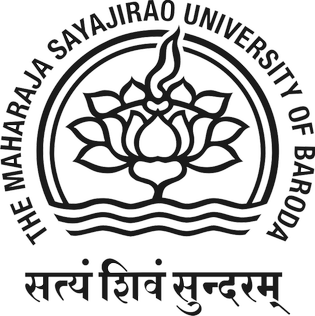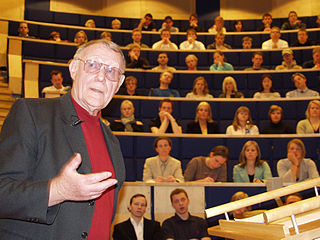Related Research Articles

An academic discipline or field of study is a branch of knowledge, taught and researched as part of higher education. A scholar's discipline is commonly defined by the university faculties and learned societies to which they belong and the academic journals in which they publish research.

Maharaja Sayajirao University of Baroda, formerly Baroda College, is a public university in the city of Vadodara, Gujarat, India. Originally established as a college in 1881, it became a university in 1949 after India's independence. It was later renamed after its benefactor Maharaja Sayajirao Gaekwad III, the former ruler of Baroda State.

The Gottfried Wilhelm Leibniz Prize, or Leibniz Prize, is awarded by the German Research Foundation to "exceptional scientists and academics for their outstanding achievements in the field of research". Since 1986, up to ten prizes have been awarded annually to individuals or research groups working at a research institution in Germany or at a German research institution abroad. It is considered the most important research award in Germany.

The L'Oréal-UNESCO For Women in Science Awards, created in 1998, aim to improve the position of women in science by recognizing outstanding women researchers who have contributed to scientific progress. The awards are a result of a partnership between the French cosmetics company L'Oréal and the United Nations Educational, Scientific and Cultural Organization (UNESCO) and carry a grant of $100,000 USD for each laureate. This award is also known as the L'Oréal-Helena Rubinstein Women in Science Awards.

The College of Sciences at the University of Texas at San Antonio in San Antonio, Texas is a college in science and research education. The college hosts more than 5000 students enrolled in fifteen undergraduate and sixteen graduate programs. The seven departments employs 286 tenure and non-tenure track faculty members. Students are exposed to collaboration through programs with local external research institutions including UT Health Science Center, Southwest Research Institute and the Southwest Foundation for Biomedical Research.

The Bayer School of Natural and Environmental Sciences (BSNES) is a fully accredited degree-granting institution and the primary college of undergraduate and graduate scientific research at Duquesne University in Pittsburgh, Pennsylvania. It was formed in 1994 with the separation of the Biological Sciences, Chemistry, and Biochemistry departments from the former College of Liberal Arts and Sciences, and subsequently named in honor of the Bayer Corporation. The school currently houses the departments of Biological Sciences, Biotechnology, Biochemistry, Chemistry, Environmental Science & Management, Forensic Science & Law, and Physics. The school also collaborates closely with the Duquesne University School of Pharmacy. In 2010, the department of Chemistry and Biochemistry was designated as a Mass Spectrometry Center of Excellence by Agilent Technologies, allowing for collaborative research into metabolics, proteomics, disease biomarkers, and environmental analysis. In 2011, Duquesne University became one of 98 universities nationwide, and one of nine Catholic universities, to be designated as a high research activity institution by the Carnegie Foundation.
The School of Biological Sciences is a School within the Faculty Biology, Medicine and Health at The University of Manchester. Biology at University of Manchester and its precursor institutions has gone through a number of reorganizations, the latest of which was the change from a Faculty of Life Sciences to the current School.

The College of Natural Science (NatSci) at Michigan State University is home to 27 departments and programs in the biological, physical and mathematical sciences.

Linnaeus University (LNU) (Swedish: Linnéuniversitetet) is a state university in the Swedish historical province (landskap) Småland, with campuses located in Växjö and Kalmar. Linnaeus University was established in 2010 by a merger of former Växjö University and Kalmar University (Högskolan i Kalmar), and is named in honour of the Swedish botanist Carl Linnaeus.

The Louis and Beatrice Laufer Center for Physical and Quantitative Biology is a multidisciplinary venue where research from such fields as biology, biochemistry, chemistry, computer science, engineering, genetics, mathematics, and physics can come together and target medical and biological problems using both computation and experiment. The Laufer Center is part of Stony Brook University. The Center's founding and current director is Dr. Ken A. Dill. Other members are Associate Director Dr. Carlos Simmerling,and Henry Laufer Endowed Professor Gábor Balázsi and affiliated faculty from the Departments of Chemistry, Physics, Applied Mathematics, Pharmacology, Biomedical Engineering, Microbiology & Immunology, Ecology & Evolution and Computer Science at Stony Brook University, as well as from Brookhaven National Laboratory and Cold Spring Harbor Laboratory. Among the Laufer Center's goals is to enhance interdisciplinary education at Stony Brook University. Dr. Gábor Balázsi coordinates the flagship course of the Center, Physical and Quantitative Biology, which is offered each Fall through the Departments of Physics, Chemistry and Biomedical Engineering.
